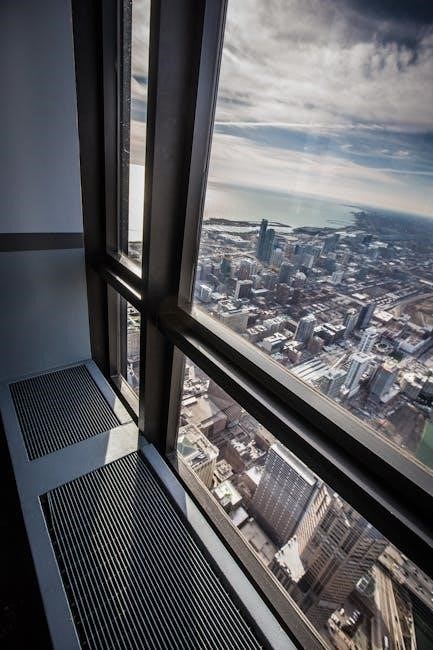An Illinois Notary Acknowledgement is a legal tool used to authenticate signatures on documents, ensuring the signer’s identity and voluntary consent. It is essential for validating legal documents.
1.1 Overview of Notary Acknowledgement in Illinois
A notary acknowledgement in Illinois is a legal process where a notary public verifies the identity of a document signer and confirms their voluntary consent. This ensures the document’s authenticity and prevents fraud. The notary witnesses the signature, checks identification, and records the act. It is widely used for deeds, contracts, and other legal documents requiring official validation. Remote notarization is also permitted under specific regulations.
1.2 Importance of Notary Acknowledgement in Legal Documents
Notary acknowledgements in Illinois are crucial for validating legal documents, ensuring signatures are genuine and voluntary. They prevent fraud and provide a legal record of the signer’s intent. Courts rely on notarized documents for authenticity, making them indispensable in real estate, contracts, and estate planning. This process protects all parties involved and upholds the integrity of legal agreements, ensuring enforceability under Illinois law.
Legal Requirements for Notary Acknowledgement in Illinois
Illinois requires notaries to verify signers’ identities, ensure voluntary consent, and adhere to specific protocols. Proper documentation and official seals are mandatory to validate acknowledgements legally.
2.1 Who Can Perform Notary Acknowledgement in Illinois
In Illinois, only commissioned Notary Publics can perform notary acknowledgements. They must be at least 18 years old, Illinois residents, and pass a state-approved exam. Non-residents employed in Illinois may also qualify. Notaries must complete a training course and submit to a background check to ensure they meet state standards and ethical requirements for the role.
2.2 Legal Standards for Notary Acts in Illinois
In Illinois, Notary Publics must adhere to strict legal standards. They must verify the signer’s identity through acceptable ID, ensure the signer acts voluntarily, and witness the signature. Notaries are required to use an official seal and maintain a journal of all notarizations. These standards ensure the integrity and authenticity of notarial acts, upholding the legal validity of documents in the state.
2.3 Signature and Date Requirements
In Illinois, the notary must witness the signer’s signature and record the date of notarization. The notary’s signature, official seal, and date are mandatory. The signer must personally appear, and the notary must verify their identity. The acknowledgement must include the notary’s printed name and expiration date of their commission. These requirements ensure the document’s authenticity and prevent fraud, making it legally binding in Illinois. Non-compliance can invalidate the document.
Structure of the Illinois Notary Acknowledgement Form
The Illinois Notary Acknowledgement Form includes sections for state, county, acknowledgment statements, signer details, and notary fields for signature, seal, and date, ensuring proper authentication.
3.1 Key Sections of the Acknowledgement Form
The Illinois Notary Acknowledgement Form includes essential sections such as state and county designations, the date of acknowledgment, and the signer’s name. It also features a statement confirming the signer’s appearance, either in person or virtually, and their acknowledgment of the document’s contents. Additionally, the form includes fields for the notary’s signature, seal, and title, ensuring proper authentication and compliance with Illinois notary regulations.
3.2 Mandatory Fields in the Illinois Notary Form
The Illinois Notary Acknowledgement Form requires specific mandatory fields, including the state and county designation, the date of acknowledgment, and the signer’s full name. The notary’s official signature and seal are also essential, along with a statement confirming the signer’s appearance and voluntary acknowledgment. These fields ensure the document’s authenticity and compliance with Illinois notary laws, preventing fraud and ensuring legal validity.
3.3 Example of a Completed Illinois Notary Acknowledgement
A completed Illinois Notary Acknowledgement includes the state (“Illinois”) and county, the date, and the signer’s full name. The notary’s official signature and seal are required. An example reads: “This instrument was acknowledged before me on [date] by [signer’s name]. (Seal) Signature of Notary Public.” This format ensures compliance with Illinois notary laws, providing a clear and authentic record of the acknowledgment.

Remote Notary Acknowledgement in Illinois
Remote Notary Acknowledgement in Illinois allows electronic document authentication via virtual meetings. It ensures legal validity while maintaining social distancing, using official forms like the Illinois Notary Acknowledgement PDF.
4.1 Remote Notarization Process in Illinois
The remote notarization process in Illinois involves electronic signatures and virtual meetings. A notary public verifies the signer’s identity through ID verification and witnesses the signing remotely. The document is then notarized digitally, ensuring compliance with state laws. This method maintains the integrity of legal documents while offering convenience and efficiency for signers across Illinois.
4.2 Requirements for Remote Notary Acknowledgement
Remote notary acknowledgement in Illinois requires compliance with Gubernatorial Executive Orders 2020-14 and 2020-18. The notary must verify the signer’s identity, ensure the document is signed voluntarily, and affix their digital signature and seal. The process must adhere to state-specific regulations, including proper authentication and record-keeping. The official ATG form (IL) is often used to ensure legality and proper formatting of the remote notarization.
4.3 Benefits of Remote Notarization
Remote notarization offers convenience, saving time and reducing costs by eliminating the need for in-person meetings. It enhances accessibility, especially for individuals with mobility challenges or those in different locations. The process is efficient, allowing documents to be notarized quickly while maintaining legal validity. Additionally, it supports environmental sustainability by reducing paper usage and promotes seamless digital transactions, ensuring security through encrypted platforms and digital seals.
Downloading and Filling Out the Illinois Notary Acknowledgement Form
The Illinois Notary Acknowledgement form can be downloaded from official sources in PDF, Word, or OpenDocument formats. It is used to certify the authenticity of document signatures.
5.1 Where to Find the Official Illinois Notary Form
The official Illinois Notary Acknowledgement form is available on the Illinois Secretary of State’s website. It can be downloaded in PDF, Word, or OpenDocument formats. Additionally, legal websites and notary associations provide access to this form, ensuring authenticity and compliance with state regulations. Always verify the source to ensure you are using the correct and updated version of the form.
5.2 Step-by-Step Guide to Completing the Form
Fill in the state and county information at the top. 2. Enter the date the document was acknowledged. 3. Write the signer’s full name and document title. 4. Include a brief description of the document type. 5. Add the notary’s signature, seal, and expiration date; 6. Ensure the signer provides a valid ID. 7. Verify all fields are completed accurately before submission.
5.3 Tips for Filling Out the Form Correctly
- Ensure all fields are neatly filled to avoid illegibility.
- Double-check the signer’s name and document title for accuracy.
- Verify the notary’s signature and seal are clear and legible.
- Ensure the signer provides valid photo identification.
- Proofread the form for errors before submission.
- Use black ink for signatures and seals for better visibility.
- Complete the form in its entirety to avoid missing sections.

The Role of the Notary Public in Acknowledgement
The notary public verifies the signer’s identity, ensures understanding of the document, and confirms the signature is voluntary, acting as an impartial witness to the process.
6.1 Responsibilities of the Notary Public
The notary public is responsible for verifying the identity of signers, ensuring they understand the document, and confirming the signature is voluntary. They must maintain impartiality, avoid conflicts of interest, and accurately complete the notarial act. The notary also ensures the document is signed in their presence and applies their official seal or stamp to authenticate the process. Proper record-keeping is essential for accountability.
6.2 Best Practices for Notaries in Illinois
Notaries in Illinois should verify the signer’s identity, ensure understanding of the document, and maintain impartiality. They must safely store their seal and stamp, refuse incomplete documents, and avoid conflicts of interest. Accurate record-keeping, adherence to state laws, and continuous education on notary practices are essential. Following these guidelines ensures the integrity and legality of notarized documents in Illinois.
6.3 Consequences of Improper Notarization
Improper notarization in Illinois can lead to legal repercussions, including invalidation of documents, fines, and loss of notary commission. It may also expose parties to fraud risks and financial damages. Failure to follow state laws and ethical standards can result in disciplinary actions, damaging the notary’s professional reputation and credibility. Proper adherence to protocols is crucial to avoid such consequences and maintain the integrity of notarial acts.

State-Specific Variations in Notary Acknowledgement
Illinois has specific laws governing notary acknowledgement, differing from other states. The format, requirements, and acceptable practices are tailored to Illinois regulations, ensuring compliance with state legal standards.
7.1 Differences in Notary Laws Across States
Notary laws vary significantly across states, with each imposing unique requirements. Illinois mandates specific acknowledgment forms and remote notarization rules, differing from other states’ protocols. These variations ensure legal compliance tailored to regional standards, emphasizing the importance of adhering to local regulations when executing notarial acts. Understanding these distinctions is crucial for accurate document authentication and legal validity.
7.2 Unique Aspects of Illinois Notary Acknowledgement
Illinois Notary Acknowledgement forms are distinct, requiring specific wording and structured sections. The state permits remote notarization under Executive Orders 2020-14 and 2020-18, allowing virtual authentication. Additionally, Illinois mandates the use of official seals and detailed signatory information. These unique aspects ensure document authenticity and legal compliance, setting Illinois apart from other states in notarial procedures and requirements.
7.3 Compliance with Illinois Notary Regulations
Compliance with Illinois Notary regulations ensures the validity of acknowledgements. The state requires official forms, proper use of notary seals, and adherence to remote notarization rules under Executive Orders. Notaries must verify signer identity, maintain records, and avoid conflicts of interest. Strict compliance prevents legal challenges and ensures documents are recognized as authentic. Failure to comply can result in documents being deemed invalid, emphasizing the importance of following Illinois-specific guidelines.

Common Mistakes to Avoid in Notary Acknowledgement
Common mistakes include incomplete forms, unauthorized signings, and improper seal usage. Ensuring all fields are filled and signatures are verified prevents legal issues.
8.1 Errors in Signature Verification
Errors in signature verification are common and can lead to legal complications. Notaries must ensure the signer’s identity and confirm the signature’s authenticity. Failure to verify the signer’s presence or authenticate the signature properly can render the document invalid. Improper verification may result in fraudulent signatures being accepted, undermining the document’s legitimacy. Notaries should always follow strict protocols to confirm identities and validate signatures accurately.
8.2 Omissions in Required Information
Omissions in required information are a frequent mistake, leading to invalid acknowledgements. Missing details such as dates, signatures, or the notary’s seal can render the document ineffective. Always ensure the form includes the signer’s name, the date of acknowledgment, and the notary’s official stamp. Incomplete fields may result in legal challenges or delays in document processing. Carefully review all sections before finalizing the notary act to avoid such oversights.
8.3 Improper Use of Notary Stamps and Seals
Improper use of notary stamps and seals is a common error that can invalidate acknowledgements. Notaries must ensure their stamps and seals are used only on completed documents with all required information. Misplacing or omitting the seal can lead to legal challenges. Always verify the placement and clarity of the notary stamp and seal to maintain the document’s authenticity and compliance with Illinois notary regulations. Proper usage is essential to avoid potential legal repercussions.
Purpose and Benefits of Notary Acknowledgement
The purpose of notary acknowledgement is to authenticate signatures, ensuring the signer’s identity and voluntary consent. It prevents fraud and ensures legal validity of documents in Illinois.
9.1 Ensuring Document Authenticity
Notary acknowledgement ensures document authenticity by verifying the signer’s identity and confirming their willingness to sign. This process involves a notary public witnessing the signature, thereby reducing the risk of fraud and ensuring the document’s legitimacy. Proper authentication also safeguards against fraudulent signatures, making the document legally binding and admissible in court proceedings within Illinois.
9.2 Preventing Fraudulent Signatures
Notary acknowledgement plays a crucial role in preventing fraudulent signatures by requiring the notary to verify the signer’s identity. This ensures that only authorized individuals sign the document. Through personal appearance and identity verification, the notary public acts as an impartial witness, reducing the likelihood of forgery. This process safeguards the integrity of legal documents, making them more secure and legally enforceable in Illinois.
9.4 Enhancing Legal Validity of Documents
The Illinois notary acknowledgement ensures that legal documents are recognized as valid and enforceable. By authenticating signatures, it confirms that all parties willingly participated in the agreement. This process strengthens the document’s legal standing, reducing disputes and challenges. Proper notarization is essential for maintaining the integrity of contracts, deeds, and other legal instruments in Illinois.
Future of Notary Acknowledgement in Illinois
Illinois is embracing digital advancements, with remote notarization becoming more prevalent. Technological innovations and evolving laws are shaping the future of notary services, ensuring efficiency and security.
10.1 Advances in Digital Notarization
Digital notarization in Illinois is advancing rapidly, with remote notarization tools enabling secure and efficient document authentication. Electronic signatures and digital seals are becoming standard, reducing the need for in-person meetings. These technologies enhance convenience while maintaining legal integrity, aligning with Illinois’ efforts to modernize notary practices. As adoption grows, digital notarization is expected to streamline processes across various industries, ensuring accuracy and compliance with state regulations.
10.2 Potential Changes in Notary Laws
Illinois may see updates to notary laws, including the potential expansion of remote notarization permissions. Legislative proposals could address digital signature standards and enhanced identity verification processes. Additionally, there may be changes to the Illinois Notary Public Act to better align with modern notarization practices. These updates aim to improve efficiency while maintaining the integrity of notarial acts, ensuring compliance with evolving legal and technological demands.
10;3 Impact of Technology on Notary Practices
Technology has revolutionized notary practices in Illinois, enabling remote notarization and digital document processing. Electronic signatures and digital platforms streamline the process, enhancing efficiency. However, these advancements require robust security measures to prevent fraud and ensure compliance with state laws. As technology evolves, notaries must adapt to maintain the integrity and authenticity of notarial acts while embracing innovations that improve accessibility and convenience for all parties involved.

Resources for Illinois Notary Acknowledgement
Official Illinois notary websites, associations, and legal consultants provide essential resources for notary acknowledgement. Downloadable PDF forms and guides ensure compliance with state-specific regulations and standards.
11.1 Official Illinois Notary Website
The official Illinois notary website provides essential resources, including downloadable PDF forms, guides, and detailed instructions for notary acknowledgement. It serves as a primary source for notaries to ensure compliance with state-specific regulations. The website, managed by the Illinois Secretary of State, offers updated information on notary laws, verification processes, and best practices. It is a reliable platform for accessing official documents and staying informed about notary requirements in Illinois.
11.2 Notary Associations and Support Groups
Illinois notary associations and support groups provide valuable resources, training, and networking opportunities for notaries. These organizations often host workshops, offer legal updates, and share best practices to ensure compliance with state regulations. They also provide forums for discussing challenges and advancements in notary practices. Joining such groups can enhance professional development and help notaries stay informed about changes in notary laws and procedures in Illinois.
11.3 Legal Consultation for Notary-Related Issues
Legal consultation is crucial for addressing notary-related issues, ensuring compliance with Illinois laws. Attorneys specializing in notary practices can provide guidance on disputes, compliance, or errors. They help interpret legal requirements, resolve conflicts, and offer solutions for improper notarization. Consulting a legal expert ensures that notaries and individuals understand their rights and obligations, preventing potential legal complications and safeguarding the integrity of notarized documents.
